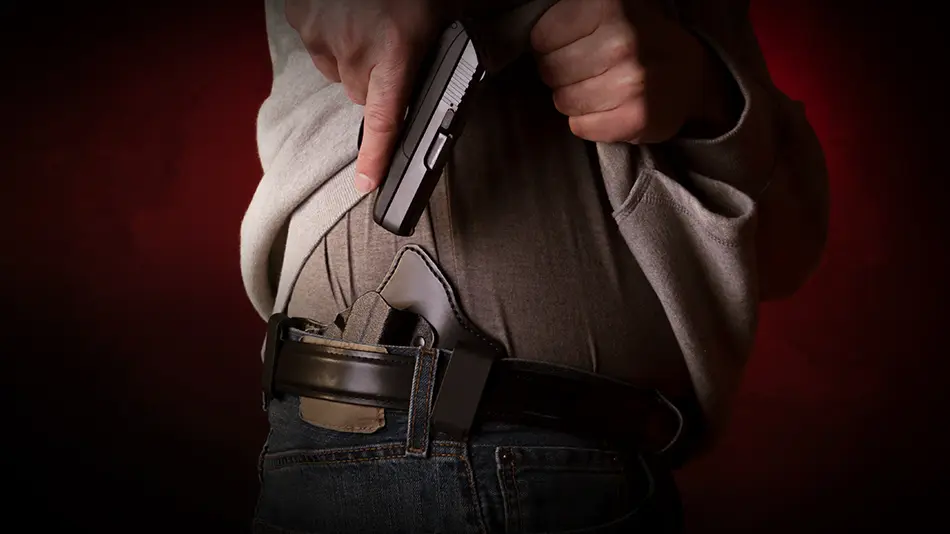The following is a video transcript.
Doug Richards for U.S. LawShield of Colorado. I want to talk to you today about a couple of misconceptions, or myths, related to firearm ownership here in Colorado.
Myth Number One: The Castle Doctrine
The first one is, “if the Castle Doctrine applies at my home, and if my vehicle is an extension of my home, then the Castle Doctrine must apply inside of my vehicle.”
That affirmative defense is only available to incidents that occur inside of your residence. If it happens outside of your residence, even in an attached or detached garage, it would not be applicable. So be very careful if you hear somebody say that the vehicle is an extension of your home, and make sure that you understand where the limits of that myth really are.
Myth Number Two: Signs Prohibiting Firearms
The second myth or misconception is that “firearm signs do not carry the force of law,” and that is true here in Colorado.
If you see one of those signs that say “firearms prohibited,” or it is a picture of a gun with a little red slash through it, in some states, if you violate that by walking into that business or that residence or wherever with your firearm, that is a separate criminal violation. It is actually unlawful in those states to do that.
Here in Colorado, it is not a separate violation. However, if you are caught violating the posted sign, you could be charged with trespass or unlawfully carrying a concealed firearm because the same statute that gives you the authority to carry concealed allows a private property owner to prohibit your concealed carry on their private property.
Beyond those two potential criminal charges, if you are found to be violating these types of signs prohibiting firearms, you could expect the sheriff that issued your CCW would quickly revoke your license.
Myth Number Three: Private Purchase of a Firearm
Now, the third myth or misconception that I hear a lot about is, “if I’m doing a private property transfer, or purchase of a firearm, or private purchase of a firearm, I don’t need to use an FFL,” and that is sometimes true.
It would be true if you are conducting a private transaction between a parent and a child, between siblings, or between spouses. But beyond that circle, you would need to use an FFL and have a background check done.
So, make sure that you follow all of your state and federal regulations when doing those transfers. And if you have any questions about that, Colorado Gun Law, or anything else we have discussed in any other videos, feel free to give me a call at my office. I’m always happy to talk to U.S. LawShield members.





In El Paso County Colorado, Outside of federally restricted gun free areas, a “no guns” sign is not supported by law. If you are found in such a facility to be carrying concealed, and the property owner wishes an individual who is carrying a
concealed firearm to leave, they must tell them specifically. Failure to leave can result in a trespass violation, but you can’t be charged, and won’t be if you leave.
The El Paso County sheriff will not revoke your concealed carry permit simply for being found in a “gun free” zone unless the person carrying escalates the issue and refuses to leave.
I found a memorandum from Jessika Shipley, Senior Analyst at the Colorado Legislative Council Staff stating, “Private educational institutions, private property owners, private tenants, private employers, and private business entities may choose to allow or prohibit open carry or concealed handguns as they see fit. In order to avoid confusion, posting a notice is recommended. Even without a posted notice; however, a private business or landowner can ask an individual to leave his or her property at any time. If the individual refuses, he or she may be charged with third degree criminal trespass, which can be a class 1 petty offense, a class 3 misdemeanor, or a class 5 felony, depending on the circumstances.”
This is excellent….good way to communicate..thank you
does the purchase of a firearm exchanged between boyfriend and girl friend need to go thru ffl
I’m still confused regarding the ability of a property owner to restrict firearms through the use of a sign. Could you further clarify the rule.
so I can give my mother an older hand gun I don’t use anymore and not have to go through a FFl ? Does it matter if she lives in MI ? and I in CO ?
In COLORADO:
In accordance to 29-11.7-104 the sign posted outside a business forbids the OPEN carrying of a firearm in that building or specific area.
In accordance to 18-12-214 (5) “Nothing in this part 2 shall be construed to limit, restrict, or prohibit in any manner the existing rights of a private property owner, private tenant, private employer, or private business entity.”
You can interrupt that to mean if they are not aware of their rights then they do not know or they are not aware of the statement; This includes concealed weapons carriers. In cases where they have posted that statement you are then violating their rights. I have only seen this at one location.
If “firearm signs do not carry the force of law”, aside from open-carry restriction rights of property owners (§29-11.7-104 C.R.S.), how can a person be “caught violating the posted sign”, or be “unlawfully carrying a concealed firearm” and be subject to expecting “the sheriff that issued your CCW [to] quickly revoke your license”? Seems to me the sign either does have the force of law and can therefore be violated, or it doesn’t and it therefore cannot.
As it was explained to me in a Colorado CWC/CCP class: Unless it is a federal building, primary or secondary school, or anywhere with metal detectors, you may carry concealed with a valid permit or open carry without one (unless you live in Denver city limits), but if asked to leave by a property owner or business employee – sign or no sign – you must do so. If you don’t leave, AND you have a gun on you, it opens up a can of legal nightmares best avoided.